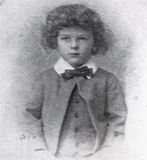
| Home | Lineage and Birth | The early years. | Conrad the Mountee. | 23rd of August 1914 | Captivity Espionage and Escapes | Augustabad | Barry Bingham VC | Conrad meets M | Conrad Assistant Military Atache. | The ffrench Connection | The Last Tigerhunt. | The Archaeology of the Reich | From Intrigue and artifice to Art. | The names Ffrench, Conrad Ffrench. | Ian Fleming | The Black Ore of Death | An Evil Medium | Off the Chessboard. | Arbutus Point. | Conrad retires to the field | The Art of Conrad O'Brien-ffrench | The Quotient of Conjecture. | News and Gossip | Bookshop & Bibliography | Mailbag | Related Links | Contact Me | |||
|
Conrad Fulke O'Brien-ffrench. Artist and Spy. |
|||
|
The early years. |
|||
|
|
|||
|
The Villa Torlonia, a former ducal residence of imposing terraces and sunken gardens, was the idyll where Conrad lived his first eight years. His grandfather, Acheson Ffrench, had once visited the area while
on the Grand Tour in 1834. Conrad remembers stories of Brigands terrorizing the local populace told to him by his grandfather
over the large kitchen grate. An entry in his grandfather’s diary reads: "Well, thank God. I have passed the most dangerous road today without molestation. Before I started
from The
ffrenches were never to be dissuaded by the prospect of attendant danger if their mind was set, a trait Conrad inherited with
aces. His father, Harry, was in his element. He became an
active participant in Roman Society. The Villa Torlonia was the scene of many lavish parties and was visited by the great
and good of Conrad’s mother, on the other hand, was not a wholehearted participant in these events.
She wished for peace and tranquility and the opportunity to enjoy these romantic environs with her beloved husband. But there
were times when these two worlds coincided and Conrad recalls blissful summer evenings when the scented air was filled with
strains of piano music from the drawing room. “I could hear my
father at the piano within, his touch strong and resonant. Having finished a Schumann arabesque he would accompany my mother
in some Mendelssohn songs, her voice not strong but true." (DM p. 11) This
rarefied and essentially privileged lifestyle contrasted darkly with the spectacle of the beggars in their abjection and the
sight of overburdened beasts being driven mercilessly by "ignorant peasants" along the sunken road of the Grotto Ferret overlooked
to the north. These earliest recollections illustrate, perhaps, the beginnings of Conrad’s ethical life-view and the
societal orbit which was to make him such a consummate master of infiltration and intelligence gathering: Conrad was to play
the role of wealthy playboy and sportsman. These early impressions and experiences already prefigure the realm he was to inhabit
for King and country. This idyllic life was to end when, for the sake of their
children's education, the ffrenches moved to The family moved again – to Montpellier Hall in When
Rollo left the Wick school, he was sent as a boarder to Just after his sixteenth birthday, Conrad was summoned to the Headmaster’s office. Rollo was dead.
An accident during a game of football at
|
|||
|
|
|||
|
|
|||



